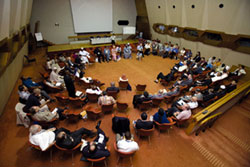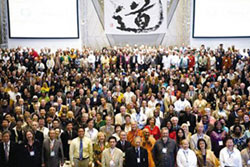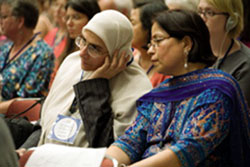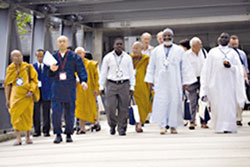Kyoto declaration
A declaration for peace by more than 800 religious leaders at the Religions for Peace Eighth World Assembly, Kyoto, Japan, August 2006
January/February 2007
Return to Table of Contents
Print Article
The following is excerpted from the Kyoto Declaration. Religions for Peace is one of the largest and oldest interfaith organizations on the planet.




Participants representing all major religious traditions and all regions of the world address the theme, "Confronting Violence and Advancing Shared Security". Religions for Peace Eighth World Assembly.
Photos credit: Religions for Peace.
We, the Assembly Delegates, come from the global Religions for Peace network of local, national, regional, and international inter-religious councils and groups, as well as networks of youth and women of faith. We recognize and build on the significant contributions and statements of youth and women of faith made in their respective assemblies.
...The first Assembly of Religions for Peace declared: "As men and women of religions, we confess in humility and penitence that we have very often betrayed our religious ideals and our commitment to peace. It is not religion that has failed the cause of peace, but religious people. This betrayal of religion can and must be corrected." It is crucial now to engrave the reflection of our respected predecessors deeply in our hearts.
A multi-religious call to action
...As religious leaders, we commit ourselves to advance shared security through advocacy, education, and other forms of multi-religious action, and to share this Kyoto Declaration within our religious communities.
We call on all sectors of society-public and private, religious and secular-to work together to achieve shared security for the human family.
Specifically, the Religions for Peace World Assembly calls on religious communities to:
- Resist and confront any misuse of religion for violent purposes;
- Become effective educators, advocates and actors for conflict transformation, fostering justice, peacebuilding and sustainable development;
- Draw upon their individual spiritual traditions to educate their members on our shared responsibilities to advance shared security;
- Strengthen peace education on all levels;
- Hold governments accountable for the commitments they make on behalf of their peoples;
- Network locally, nationally, regionally and globally to foster multi-religious cooperation among the world's religious bodies; and
- Partner with governments, international organizations and other sectors of society to confront violence and advance a new notion of shared security.
Return to Table of Contents
Print Article